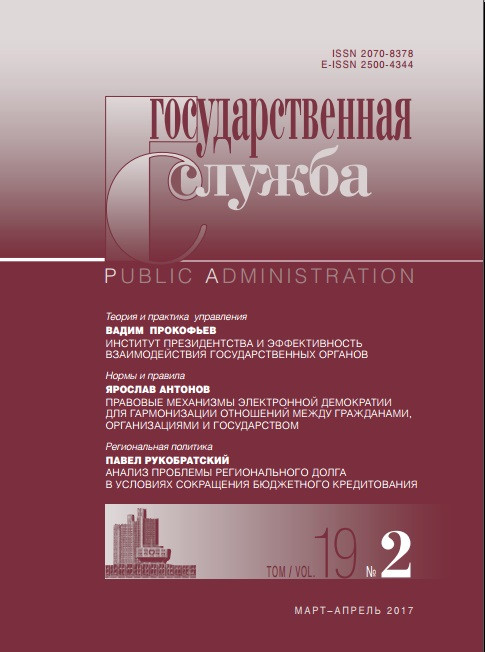Рекомендуемая ссылка на статью:
Сергей Игоревич Колотова
аМинистерство финансов Российской Федерации
DOI: 10.22394/2070-8378-2017-19-2-46-51
Аннотация:
Несмотря на значительное количество исследований, изучение теоретических вопросов и практического опыта в области формирования и реализации кластерной политики, повышения конкурентоспособности региона, решение данной задачи сохраняет свою актуальность. Целью статьи стало изучение концепции кластера и кластерной политики, которые открывают новый ракурс в развитии национальной и региональной экономик и считаются одним из наиболее значимых факторов конкурентоспособности региона на современном этапе. Основным методом исследования был выбран сравнительный анализ теории кластера и кластерной политики, представленной в научных трудах российских и зарубежных ученых. В работе подчеркивается, что кластерная политика может быть эффективно реализована, опираясь на специфические особенности структуры экономики в масштабе территории Российской Федерации. Кластерная политика интегрируется в российскую экономику регионов вместе с другими подходами, разработанными и успешно применяемыми в плановой экономике. Автор рассматривает следующие виды кластеров: индустриальные (за пределами определенного региона), те, в которых явно выражены доли участия компаний в процессе формирования добавленной стоимости, и кластеры в пределах определенного региона. Они отличаются, как правило, высокой концентрацией мелких и средних компаний, при этом предприниматели имеют четко выраженную специализацию и нацелены на удовлетворение запросов потребительского рынка. Делается вывод о том, что основными предпосылками формирования эффективной кластерной системы в России могут служить наличие в регионе конкурентоспособных предприятий, обширный набор субъектов рыночных отношений.
Abstract:
Despite the considerable research and study of theoretical issues and practical experience in the sphere of formation and implementation of the cluster policy, raising competitiveness of the region, the solution of this problem remains highly relevant. The purpose was the study of the concept of cluster and cluster policy which opened a new perspective for the development of national and regional economies and is considered as one of the most important factors of regional competitiveness at the present stage. The primary chosen method was the comparative analysis of the cluster theory and cluster policy given in the research materials and scientific works by the Russian and foreign scientists. It is emphasized that the cluster policy can be effectively implemented basing on the specific features of the economic structure on the scale of the Russian Federation territory. The cluster policy is integrated into the Russian economy of the regions in conjunction with other approaches developed and successfully applied in the planned economy. The following types of clusters are considered by the author: industrial (outside the exact region), the ones that have the explicitly expressed shares of the participation of the companies in the process of the formation of the added value and the clusters inside the particular region. They are distinguished, as a rule, by a high concentration of small and medium companies, therewith the entrepreneurs have the explicitly specified specialization and aim to comply with the requests of the consumer market. The conclusion is made that the main prerequisites of the formation of the effective cluster system in Russia can become the presence of the competitive enterprises in the region, the wide range of the economic agents.
Ключевые слова:
кластер, кластерная политика, инновации, конкурентоспособность, региональное развитие
Keywords:
cluster, cluster policy, innovations, competitiveness, regional development
Литература:
Взаимодействие малого и крупного бизнеса // Информационно-аналитический сборник. Институт предпринимательства и инвестиций. М., 2015.
Николаев М.В. Экономическая глобализация и проблемы национальной безопасности // Проблемы современной экономики. 2015. № 1(13).
Портер М.Э. Конкуренция / пер. с англ.: Учебное пособие. М.: «Вильямс», 2015.
Современные проблемы менеджмента. Материалы IX Всероссийской научно-практической конференции. Сб. научн. трудов. СПб.: СПбГЭТУ «ЛЭТИ», 2015.
Spatial analysis, industry and the industrial environment. Progress in research and applications. Vol. 1. Industrial systems / Ed. by F.E.I. Hamilton and Linge G.J.R. Chichester, N.Y., Brisbane, Toronto: Wiley, 1979.
References:
Nikolaev M.V. Ekonomicheskaya globalizaciya i problem nacional’noi bezopasnosti [Economic globalization and problems of national security]. In: Problemy sovremennoi ekonomiki. 2015. № 1(13). In Russian.
Porter M.E. Konkurenciya [On competition] / Transl. from English. A Manual. M.: «Vil’yams», 2015. In Russian.
Sovremennye problem menedzhmenta [Contemporary problems of management]. Materials of IX all-Russian scientific-practical conference. Collection of scientific works. St. Petersburg: «Leti», 2015. In Russian.
Spatial analysis, industry and the industrial environment. Progress in research and applications. Vol. 1. Industrial systems / Ed. by F.E.I. Hamilton and Linge G.J.R. Chichester, N.Y., Brisbane, Toronto: Wiley, 1979. In English.
Vzaimodejstvie malogo i krupnogo biznesa [The interaction of small and large businesses]. In: Informacionno-analiticheskii sbornik. Institut predprinimatel’stva i investicii. M., 2015. In Russian.
Статьи в режиме Open Access публикуются в соответствии с лицензией Creative Commons Attribution 4.0 International (CC BY).

